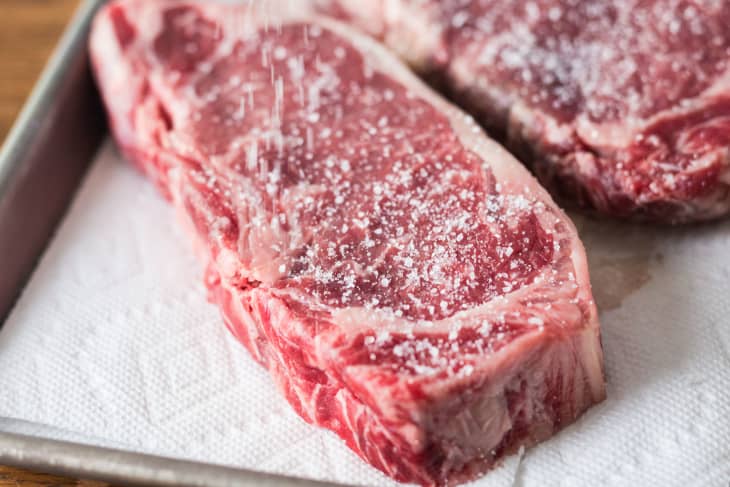How (and Why!) To Preseason Your Meat
In our house we’re not so big on marinating meat, but we love to preseason it. We realize, of course, that this lands us smack in the middle of a food controversy. There are those who would argue that salt will leach the juices out of your meat, and therefore should be left to the last minute. Time and again, however, our experience has proved otherwise. Click through for the science, and for some practical advice about how (and how much) to preseason your meat.
The Zuni Café Cookbook contains endless wisdom, and within it you’ll find a straightforward, convincing explanation of the science of salting meat early. It’s all about allowing the salt to penetrate the meat cells all the way through (not just on the surface). We’ll try to paraphrase.
On the cellular level, two things are going on to make a preseasoned piece of meat more tender and flavorful:
• 1 The salt helps break down some of the proteins in the muscle that would otherwise make it tough to chew.
• 2 At first, the salt does draw moisture out of the cells in the meat as well (that’s why some cooks worry it will dry out). But if you give it enough time, the cells will reabsorb moisture through reverse osmosis, and in doing so they will absorb the salt itself (as well as any other aromatics you’ve used, like pepper or sugar). The salt also alters the proteins, opening them up so they can trap more moisture. Then when you eventually cook the meat, it retains that nice salty juice all the way through.
Zuni’s rules for preseasoning your meats are these:
Timing. Season at least several hours ahead of time, preferably one to three days. This gives the salt plenty of time to penetrate to the center of your meat. (It’s actually quite convenient; just salt the meat right when you bring it home from the store on the weekend, refrigerate, then slap it on the grill during the week.) Season large or dense cuts of beef (like roasts) farther in advance; skinny, more tender cuts like skirt steak can be salted closer to cooking time.
Measuring. Since you’re seasoning when the meat is raw, you obviously can’t salt “to taste.” But once you get in the habit of doing this regularly, you’ll start to get a feel for how much salt you need (and what this looks like on the meat’s surface). To get you started: For most meats, including chicken, Zuni recommends 3/4 teaspoon of sea salt per pound of meat (a little more if using kosher salt).
Since we started using this method at home, we’ve stopped keeping extra salt on the dinner table at all. Still skeptical? Give it a try in honor of Meat/Un-Meat Month!
Related: How to Brine Meat (similar scientific concept, equally delicious results)
